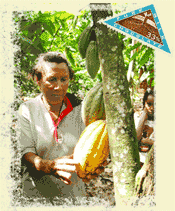Letters to the editor, May 2004
This article was originally published in May 2004
Farm policy education
Wow! Talk about a neat, informative publication — reading this newsy item was like getting a mini-independent education (Food 101!) Thank you for such a fine “Foodpaper.”
— Janet Parsons
p.s. I frequent the West Seattle PCC. I’m just crazy about the deli “fresh” scones — and the meat section. I’m a fussy old bird and your meat section is the VERY BEST!
Corporate disclosure on GE crops
I think it is important to maintain awareness of the dangers of GE (genetically engineered) foods and what corporations and governments are doing to introduce them without full and honest disclosure to the public.
Along this line, I just received a news-paper article from the New Zealand Central Leader on the devastating results of testing of GE crops in Britain that were actively suppressed by the government. I hope that you can use this material in your next monthly newspaper.
— Russ Hamerly, Boeing IT Services
Editor: The newspaper article reported results on six years of monitoring genetically modified (GM) crops in Britain and has been called “politically explosive.” The results were the first from official farm-scale trials and showed that genes from GE crops are interbreeding on a large scale with natural crops, and with weeds.
The results first were reported in December 2002 by the respected British newspaper, The Independent, which said, “The study is so devastating to the government’s case for GM crops that ministers sought to bury it by publishing the first information on it on the Department of the Environment, Food and Rural Affairs Web site on Christmas Eve.
The full report, with much more devastating detail, was withheld from publication on the Web site. The department said that it was available on request, but when The Independent tried to ask for it, the department said no one was available to provide it. The government repeatedly has said the results would settle the question on whether GM crops endangered the environment. But it has been playing down their significance in recent weeks.”
The Independent article may be accessed for a fee at http://news.independent.co.uk. For more recent articles, search The Independent’s Web site under “News,” “UK,” then “environment” and also, www.thecampaign.org.
Notes to the curmudgeon in the cellar
As an active wine enthusiast and PCC shopper, I look forward to reading Jeff Cox’s “Notes from the cellar” in the PCC Sound Consumer every month. I must admit some disappointment with the lack of focus on actual wines, and more focus on the marketing and sales of wineries.
I find it very ironic that Mr. Cox writes every month to abandon larger wineries and what he deems commercial brands. Maybe Mr. Cox does not know that his wine and beer departments carry beer from the world’s largest brewer (with the largest marketing budget also), wine from the world’s largest winery, and even carries and promotes Washington wine and Washington sparkling from a winery that is owned by one of the world’s largest tobacco manufacturers.
Please continue the “Notes from the cellar” column. Myself and others look forward to learning about food and wine pairing, new varietals, upcoming winemakers, wineries and regions.
— Mike Barnes, Wallingford
Jeff Cox, Wine and Beer Merchandiser: Thanks for your comments! I’m glad to hear that somebody is actually reading my periodic screed. I started writing this column mainly as a vehicle for passing along wine and beer-related information. All well and good — and I’ll continue to do pieces with that goal in mind from time to time — but it has occurred to me since that wine makes a nice metaphoric launching pad for a host of other interesting, relevant topics. It also seems to me that most wine journalism is pretty stale in both style and content. Ergo, be it quixotic, be it even narcissistic on my part, I’m trying to approach the task with a different voice as well as a different perspective.
Your point about Chateau Ste. Michelle, Kendall-Jackson, and the host of other “corporate” wines/beers to be found on our shelves is well taken. I’m certainly aware of what they are as well as what they represent, and in my private utopia there are none of them in the cellar. But I think it’s important to offer all our customers choices with which they’re comfortable — even if some of those choices aren’t necessarily representative of the ideals I like to promote. So, you’ll continue to see just a handful of mainstream, corporate wines and beers on our shelves, even as we downplay them in favor of promoting the fruits of small, independent, passion-driven producers.
Thanks again for taking the time to convey your comments, and please continue to do so as you are compelled — it keeps me honest. Salut!
Sustainable chocolate

This is a link to a Worldwatch article about chocolate: www.worldwatch.org/pubs/goodstuff/chocolate/. I thought it might make a good story for the PCC newspaper.
— Rika Cecil, Environmental Educator, City of Shoreline
Editor: Thank you, Rika, for sharing this resource. PCC has been aware of sustainability issues in the chocolate industry and our buyers are mindful of them in choosing what we offer in our stores. The Sound Consumer ran a major cover story on Fair Trade chocolate just before Easter last year. The information is still quite relevant. Read it on our Web site. At www.pccnaturalmarkets.com, click on the Resources tab, then search under Sound Consumer archives for the February ’03 cover story, Fair Trade Chocolate.
